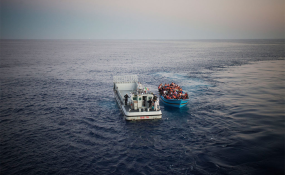
The European Commission announced on Thursday that it was extending its rescue mission in the Mediterranean Sea off Italy until at least the end of the year. It also granted Rome extra funding to deal with an influx of migrants from Africa and the Middle East.
When Italy wound down its costly Mare Nostrum operation in November last year the European Commission launched Operation Triton.
Managed by the European Union’s border control agency Frontex, it was only expected to run for a few months with greatly reduced funds, fewer ships and a smaller operational area than Mare Nostrum.
But the flow of migrants arriving spurred by the turbulence in the Middle East and Africa looks set to increase.
More than 5,000 migrants have already arrived in Italy this year.
Given the growing pressure, the commission handed Italy 13.7 million euros of emergency funding, which came on top of more than 500 million euros earmarked for Rome for the 2014-2020 period.
Related Story:
European Commission’s Announcement On Migration – Right Words, but No Solutions
PRESS RELEASE
Today’s announcement by the European Commission on managing the migration crisis in the Mediterranean contains the right analysis of the overall situation, but offers no concrete solutions to protecting and saving lives, said Amnesty International.
“We agree that a European solution to the search and rescue crisis is urgently needed, but that’s not being offered here. Member states need to step up and chip in. Extending operation Triton without increasing its assets and operational area changes absolutely nothing,” said Iverna McGowan, acting director of Amnesty International European Institutions Office.
During a press briefing in Brussels, Dimitris Avramopoulos, European Commissioner for Migration, Home Affairs and Citizenship, acknowledged that the European Union (EU) needed to react more efficiently to the “ever starker” reality of the rising number of migrants, asylum-seekers and refugees attempting to cross the Mediterranean.
Despite Mare Nostrum’s closure, Italy’s coast guard has continued to lead on life-saving operations in the central Mediterranean – contributing to the rescue of more than 2,800 people last weekend alone, including the deployment of Frontex assets. The loss of more than 300 lives earlier this month near the Italian island of Lampedusa underscored the glaring gap in search-and-rescue resources.
“The latest Lampedusa tragedy laid bare yet again the woeful inadequacy of the European Union’s current border control approach to the spiralling humanitarian crisis in the Mediterranean. Today’s announcement has failed to change the simple fact that without more resources from member states for search and rescue, more people will die on the high seas,” said John Dalhuisen, Europe and Central Asia Programme Director at Amnesty International.






























